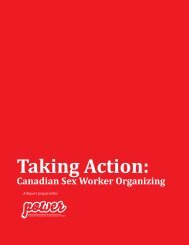challenging prostitution laws: bedford v. canada - POWER
challenging prostitution laws: bedford v. canada - POWER
challenging prostitution laws: bedford v. canada - POWER
You also want an ePaper? Increase the reach of your titles
YUMPU automatically turns print PDFs into web optimized ePapers that Google loves.
the rights’ violations of sex workers who live and work in the<br />
most difficult conditions, and who are most frequently prosecuted<br />
under this law. It is noteworthy that two judges dissented,<br />
meaning that two of the five judges wanted s. 213(1)(c) to be<br />
struck down.<br />
Here are factors that the ONCA majority decision either ignored<br />
or misunderstood:<br />
· The ONCA misunderstood the range of the <strong>laws</strong>’ impacts.<br />
They focused exclusively on the fact that this law prevents<br />
us from screening clients and ignored the other ways that it<br />
diminishes sex workers’ safety as we try to dodge cops<br />
and avoid arrest. Impacts such as:<br />
· Displacing sex workers into more isolated and therefore<br />
unsafe areas;<br />
· Preventing us from working together, once again<br />
increasing our isolation; and<br />
· Preventing us from taking the time to screen vehicles<br />
before entering.<br />
· They undervalued the importance of screening clients. This<br />
law prevents us from having the time to properly negotiate<br />
and communicate our limits to clients about services,<br />
prices, locations and safety practices. It is also these first<br />
moments of contact with a client where clients become<br />
more accountable to workers -- we receive their name, their<br />
interests and other information about them so that we have<br />
an idea of whom we’re engaging with.<br />
· They refused to understand our s. 7 right through an<br />
equality analysis. They recognize that sex workers who<br />
work on the street are disadvantaged because of poverty,<br />
addiction, gender, race and age, and admit that this law<br />
contributes to some degree of harm. But they felt that the<br />
harmful effects of this law are diminished because of our<br />
poverty, addiction, gender, race and age, and cannot be<br />
quantified.<br />
Not only does this law put us at greater risk of violence and<br />
stigma but it also:<br />
· Places us at greater risk of negative treatment by police,<br />
potential employers, landlords, health care providers and<br />
members of the general public;<br />
· It imposes additional barriers for sex workers who want to<br />
access services and stop doing sex work;<br />
· It imposes additional barriers to the possibility of sex<br />
workers accessing labour protections, rights and<br />
entitlements; and<br />
· It reinforces the idea that we are not valuable members of<br />
our neighbourhoods and that our voices and realities<br />
should not be respected and included, but rather that we<br />
are a “social problem” that needs to be regulated.<br />
NEXT STEPS<br />
5<br />
interveners in Bedford v, Canada<br />
A Charter Challenge usually begins with two parties: the plaintiff(s)<br />
and a government. As the case moves along, different groups may join<br />
in as interveners. Interveners don’t become a party in the case, but in<br />
most cases they become allied with the party they intend to support.<br />
If a group wants to intervene they have to get permission from the court<br />
by convincing the court that they have an expertise in the area and<br />
will bring forward new and relevant arguments that will help the court<br />
understand the case. Although groups might have a similar and consolidated<br />
message or priority, each intervener has to “take on a new<br />
angle” or unique perspective if they want to be accepted as separate<br />
interveners. If they do not have a “unique perspective,” and specifically<br />
if they do not have a unique legal argument, the court will most likely<br />
not allow them to intervene. Groups that take on the same perspective<br />
can try to intervene as one united coalition.<br />
Groups that have intervened in Bedford so far, at the<br />
Ontario Court of Appeal:<br />
In support of striking down all three <strong>laws</strong>:<br />
Coalition:<br />
· Providing Alternatives Counselling and Education Society (PACE)<br />
· Pivot Legal Society (Pivot)<br />
· Downtown Eastside Sex Workers United Against Violence (SWUAV)<br />
Coalition:<br />
· Maggie’s Toronto Sex Workers Action Project<br />
· Prostitutes of Ottawa Gatineau Work Educate Resist (<strong>POWER</strong>)<br />
Coalition:<br />
· Canadian HIV/AIDS Legal Network and British Columbia<br />
· Centre for Excellence in HIV/AIDS<br />
· British Columbia Civil Liberties Association (BCCLA)<br />
· Canadian Civil Liberties Association (CCLA)<br />
In support of upholding the <strong>laws</strong> (fully or in part):<br />
Christian Legal Fellowship (CLF)<br />
Catholic Civil Rights League (CCRL)<br />
REAL (Realistic, Equal, Active for Life) Women of Canada<br />
Coalition:<br />
· Canadian Association of Sexual Assault Centres,<br />
· Canadian Association of Elizabeth Fry Societies, Native Women’s<br />
· Association of Canada, Action Ontarienne Contre La Violence<br />
Faite Aux Femmes,<br />
· Concertation des Luttes Contre L’Exploitation Sexuelle<br />
· Regroupememt Québécois des Centres d’Aide et de Lutte Contre<br />
les Agressions à Caractère Sexuel<br />
· Vancouver Rape Relief Society.<br />
Other groups and provincial governments may intervene at the Supreme<br />
Court level.<br />
The SCC will hear Bedford on June 12th, 2013. The decision at the Supreme<br />
Court level will be final and will impact sex workers across Canada.<br />
Writing and Research Tara Santini<br />
Project Coordinator: Jenn Clamen<br />
Reading and Editing Committee Marie-Claude Charlebois, Sandra Ka Hon Chu<br />
(Canadian HIV/AIDS Legal Network); Jenn Clamen; JD Drummond; Katrina Pacey<br />
(Pivot Legal Society) & Emilie Laliberté.<br />
Design Marie-Claude Charlebois & Elitza Koroueva<br />
InfoSheet is available in French and may be copied or translated into various languages<br />
upon request, but not sold. We ask that Stella be credited as the source.<br />
This series of InfoSheets is made possible thanks to the financial support of the<br />
Open Society Foundations (OSF). The opinions expressed here are those of the<br />
author and do not necessarily reflect the official position of the foundations.<br />
www.chezstella.org<br />
2065 rue Parthenais, suite 404<br />
Montréal QC<br />
H2K 3T1<br />
Office 514.285.1599<br />
Drop-in 514.285.8889<br />
Stella is a community organization created and run by and for<br />
sex workers. At Stella we provide support and information to<br />
sex workers so that we may live and work in safety and with<br />
dignity.<br />
Copyright Stella, 2013<br />
Published in April 2013<br />
6







